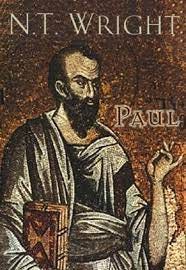One of the things N.T. Wright has said, which annoys a lot of people and gets them riled up, is when he claims that Paul articulates something like justification “on the basis of a life lived.”[1]
Now, if you are used to thinking about justification by grace through faith, then yes, that language is confusing and perhaps even disconcerting. And to be fair, it’s certainly not the language I use when I talk about justification or even justification and works.
But there are a few things to remember before you sharpen your pitchfork and start throwing it at a manquin painted to look like N.T. Wright.
First, Tom often makes generalized comments which are intended to affirm something important or to deny something erroneous, but his remarks do not always exhibit sensitivity to some of the code words that set people off in certain theological tribes. While judgment according to works is a biblical idiom, final justification on the basis of a life lived is like a red flag to a Protestant bull.
Second, when it comes to justification by faith and judgment by works, the Christian tradition in general and the Reformed tradition in particular have proffered several options.
Augustine said that we are saved by faith, judged by works, and since the good works in us are performed by the Holy Spirit, not from ourselves, God rewards his own work in our lives. That was to be an influential view during the Reformation, but it was applied differently.
Martin Bucer believed in a double justification, the first by faith, and the second by works.
The Belgic Confession states: “[W]e are indebted to God for the good works we do, and not he to us, since it is he who ‘works in us both to will and do according to his good pleasure’ [Phil 2:12].”
According to the Tetrapolitan Confession: “But since they who are the children of God are led by the Spirit of God, rather than that they act themselves (Rom 8:14), and ‘of him, and through him, and to him, are all things’ (Rom 11:36), whatsoever things we do well and holily are to be ascribed to none other than to this one only Spirit, the Giver of all virtues. However it be, he does not compel us, but leads us, being willing, working in us to both will and to do (Phil 2:12). Hence Augustine writes wisely that God rewards his own works in us. By this we are so far from rejecting good works that we utterly deny that anyone can be saved unless by Christ’s Spirit he be brought thus far, that there be in him no lack of good works, for which God has created in him”.


